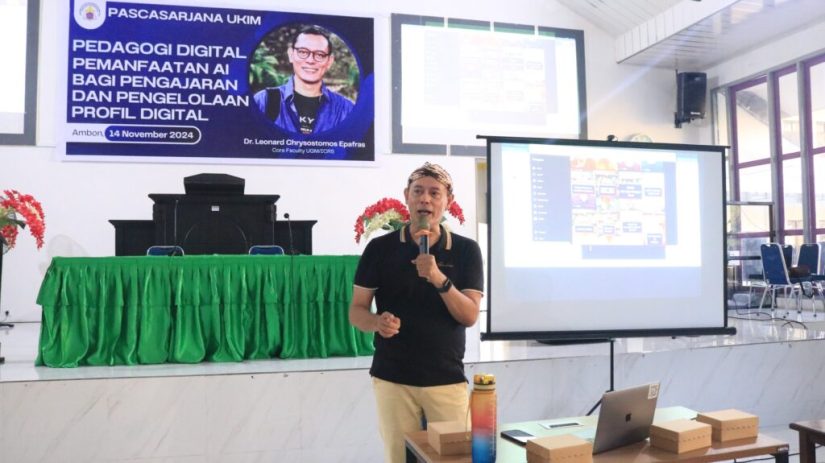
The massive development of digital technology today has gradually changed the learning process in various educational institutions, especially universities. Digital technology can no longer be denied in the learning process and affects the academic interaction between educators (teachers/lecturers) and learners (students). In this case, universities must provide a progressive and creative response rather than just being reactive, even emphasizing it.
With this academic awareness, Universitas Kristen Indonesia Maluku (UKIM) strengthens the intensity of cooperation with Gadjah Mada University (UGM) and the Indonesian Consortium for Religious Studies (ICRS) through joint academic activities. On Friday, November 14, 2024, at the UKIM hall, the UKIM Postgraduate Program invited Dr. Leonard Chrysostomos Epafras (Core Faculty UGM/ICRS) to give a public lecture for lecturers and postgraduate students. The theme of the public lecture chosen was “Digital Pedagogy: Utilization of Artificial Intelligence in Learning and Digital Profile Management” which is directly directed at achieving competence in understanding and skills in using several AI applications or PromptBots for the benefit of teaching and research of the UKIM postgraduate academic community.
UKIM Postgraduate Director, Prof. Dr. John Chr. Ruhulessin, M.Si., in his welcoming speech, expressed his gratitude for Dr. Leonard C. Epafras’ willingness to be a resource person/facilitator at this public lecture. Ruhulessin saw that as a growing university, UKIM must respond positively and constructively to the development of digital technology and Generative AI, because the development itself cannot be stopped. What must be done, continued Ruhulessin, is to understand its characteristics and manage it as a learning support instrument, as well as research development for knowledge that benefits humanity. Therefore, Postgraduate UKIM strongly supports this activity, which also marks the stretching of academic activities on this campus.
For about two hours, Epafras reviewed the pedagogical paradigm in the digital era and mindset changes in educational interactions in higher education. Several examples were presented by Epafras to introduce approaches to teaching (for lecturers) and learning (for students) that critically and constructively utilize AI technology. A lively discussion took place as several lecturers and postgraduate students who participated in this activity expressed a number of critical views and questions, related to academic ethics and human capacity development which are now supported by AI technology. The public lecture concluded with an agreement that there are strategic issues that need to be addressed.
This article is originally translated from here
